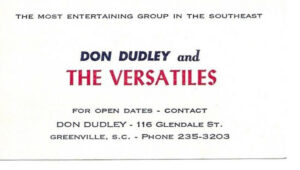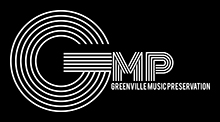Don Dudley rides the edge
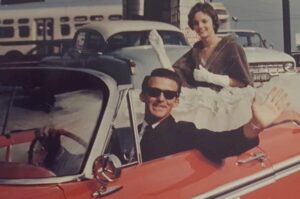
Joseph Floyd Edge was known professionally as Don Dudley. He was a songwriter, a producer, a disc jockey and a musician. He produced country, rock’n’roll, gospel and soul records. He also played a foundational role in the early days of Mark V Studios.
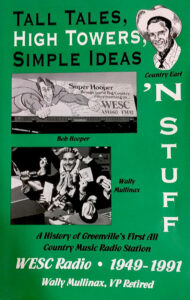
“In the last half of the fabulous Fifties, Country Earl with his early morning Country Earl Show and mid-morning Gospel Train, Floyd Edge as Uncle Dudley and the Chicken Shack helped make WESC a very successful radio station.” (from the book: Tall Tales, High Towers, Simple Ideas ‘N Stuff, by Wally Mullinax, Wally Mullinax Communications Consultants Inc., 2003 p.89)
In the 1950’s Edge began his broadcasting career at Greenville station WESC. His Uncle Dudley show was instrumental in establishing the country music identity of the station.
As the station grew and rockabilly took over national airwaves, Edge adapted his pseudonym to Don Dudley to achieve a less provincial feel.
Dudley’s son Jeremy Edge sees the logic. “With his first character he played, basically, a redneck named Uncle Dudley. But then, when he switched to the rock format, in order to keep some of that name recognition and still sound rock’n’roll, he went with Don Dudley. “
Among Don Dudley’s colleagues at WESC was Country Earl Baughman. Don Dudley and Country Earl worked day jobs at WESC while running around by night to make Greenville’s music scene. The bands these two put together would end up being a training ground for one of the defining groups of the rockabilly era.
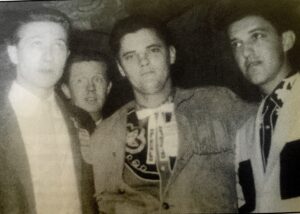
“Country” Earl Baughman flanked by Scotty Moore and DJ Fontana.
Baughman’s Circle E Ranch Gang and Don Dudley’s band, TheTunetoppers, shared a cast of musicians with Gene Vincent and The Blue Caps. Greenville’s Paul Peek, Johnny Meeks, Bobby Jones and Bill Mack all played with the Circle E Ranch Gang and TheTunetoppers at various times. All of them would go on to to play with Vincent and achieve legendary status among rockabilly fans. Meeks , Jones and Peek would appear with the Blue Caps on the Ed Sullivan Show performing Dance To the Bop, written by none other than Floyd Edge.
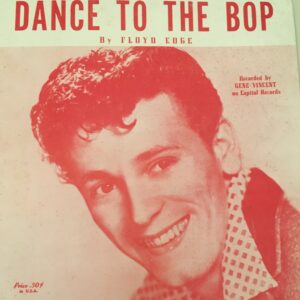
Jeremy Edge tells of the night the gang back in Greenville watched their friends perform on Ed Sullivan. “I think there was some saltiness (on the part of Dudley and Country Earl) because that was half of their band. Bobby Jones was the bass player in my Dad’s band for a long time. A bunch of those guys played with him and with Country Earl. It was hard to see them hitting it big with Gene Vincent while they were still in Greenville.”
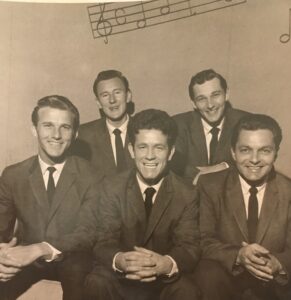
The Tunetoppers
It was another set of bandmates that opened the door for Dudley’s next venture. Bill and Harold Huffman had both been Tunetoppers for a spell. Word got to Dudley they were building a studio. He used his broadcast skills and his contacts in the radio world to help get the project off the ground.
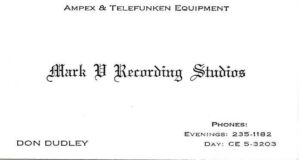
Although Dudley’s time at Mark V was brief, he was instrumental in the formation of the studio. He salvaged the first recording console they used from a fire that damaged Spartanburg station WSPA . With the gear they needed in hand, the three Huffman brothers and Dudley had the makings of a recording enterprise in place.
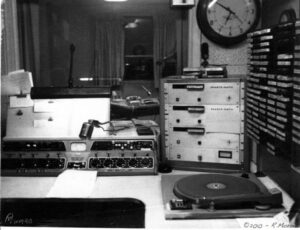
Control Room of WMRB, circa 1960. This is the station that leased Mark V their first building. The Gates console at front left is similar to the fire-damaged model Dudley got from WSPA.
Dudley departed the new studio early on, possibly to pursue his performing career. The Tunetoppers got a regular gig at ThePalomino club in Los Angeles around this time. The Edge family followed their patriarch out to California to hobnob with rock’ n’ roll royalty. Jeremy Edge recounts a story he remembers his Dad telling.
“One night at the The Palomino Little Richard came in. After the show he invited the band back to his place to party. My dad said he had the whole place done up in pink satin, and he had heart-shaped beds in all the bedrooms.”
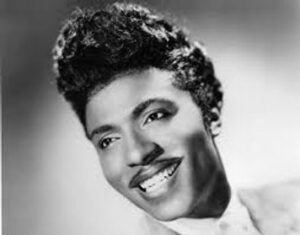
Dudley’s daughter Candy Poff and son Jeremy Edge both remember their mother being none too keen on the move to LA. The residency at The Palomino must not have produced any great opportunities, because Dudley was back in Greenville soon after.
Dudley already had a producer credit on a record by friend and WESC colleague Allan Riddle (spelled variously Allen, Alan or Allan), 1960’s The Moon Is Crying. The song had reached #96 on the national country charts. It was released on the Plaid record label out of Greenville. Plaid records was the brainchild of a gentleman named Charles Rush.
Around ’60-’61 records began appearing on the Kall label that credit Dudley as producer. Many of these sides list the publisher as Duride. Others are labelled “A Riddle-Rush Production”. A logical conclusion is that Don Dudley, Allen Riddle and Charles Rush sought to capitalize on the success of The Moon Is Crying with Kall Records. Duride Publishing could be a combination of the names Dudley/Riddle. No one knows for sure. Jeremy Edge remembers hearing that his father was, indeed, involved in a label in the early sixties.
”It was Dad, Allen Riddle and a third guy. I can’t remember who he was, but they had a little label recording country and rockabilly stuff,” Edge said.
Kall released a couple more Allen Riddle singles along with a slew of bopping country records from South Carolina musicians who are mostly lost to the ages. Taken together, the Kall Records discography is a snapshot of a time and place where honky-tonk country, rockabilly, mountain music and pop all swirled together. The music conjures images of factory workers, truck drivers and farm hands picking away on the front porches and in the beer joints of mill hill neighborhoods.
